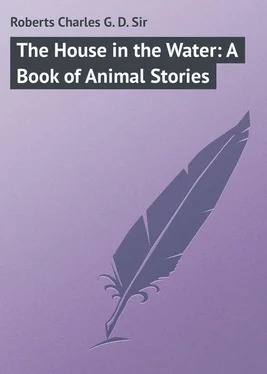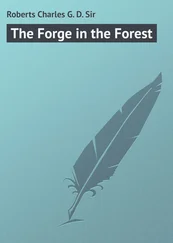Charles Roberts - The House in the Water - A Book of Animal Stories
Здесь есть возможность читать онлайн «Charles Roberts - The House in the Water - A Book of Animal Stories» — ознакомительный отрывок электронной книги совершенно бесплатно, а после прочтения отрывка купить полную версию. В некоторых случаях можно слушать аудио, скачать через торрент в формате fb2 и присутствует краткое содержание. Жанр: foreign_humor, Природа и животные, foreign_prose, Анекдоты, foreign_language, на английском языке. Описание произведения, (предисловие) а так же отзывы посетителей доступны на портале библиотеки ЛибКат.
- Название:The House in the Water: A Book of Animal Stories
- Автор:
- Жанр:
- Год:неизвестен
- ISBN:нет данных
- Рейтинг книги:5 / 5. Голосов: 1
-
Избранное:Добавить в избранное
- Отзывы:
-
Ваша оценка:
- 100
- 1
- 2
- 3
- 4
- 5
The House in the Water: A Book of Animal Stories: краткое содержание, описание и аннотация
Предлагаем к чтению аннотацию, описание, краткое содержание или предисловие (зависит от того, что написал сам автор книги «The House in the Water: A Book of Animal Stories»). Если вы не нашли необходимую информацию о книге — напишите в комментариях, мы постараемся отыскать её.
The House in the Water: A Book of Animal Stories — читать онлайн ознакомительный отрывок
Ниже представлен текст книги, разбитый по страницам. Система сохранения места последней прочитанной страницы, позволяет с удобством читать онлайн бесплатно книгу «The House in the Water: A Book of Animal Stories», без необходимости каждый раз заново искать на чём Вы остановились. Поставьте закладку, и сможете в любой момент перейти на страницу, на которой закончили чтение.
Интервал:
Закладка:
This different suggestion Jabe did not take the trouble to controvert. He knew the Boy did not mean it.
“But I thought as how ye wouldn’t kill anything?” he went on, teasingly.
“Had to!” retorted the Boy. “That was self-defence! Those beavers are my beavers. An’ I’ve always wanted a real good excuse for getting a good lynx skin, anyway!”
“I don’t blame ye a mite fer standin’ by them beaver!” continued Jabe. “They’re jest all right! It was better’n any circus; an’ I don’t know when I’ve enjoyed myself more.”
“Then the least you can do, Jabe, is promise not to trap any more beavers!” said the Boy quickly.
“Wa’al,” answered Jabe, as they entered camp and began spreading their blankets, “leastwise I’ll do my best to see that no harm comes to them beaver, nor to the pond.”
Next morning, as the woodsman was starting out for the day’s cruise, the Boy said to him:
“If you’re game for another night’s watching, Jabe, I’ll show you something altogether different up at the pond to-night.”
“Try me!” responded the woodsman.
“You’ll have to be back earlier than usual, then,” said the Boy. “We’ll have to get hidden earlier, and in a new place.”
“I’ll come back along a couple of hours afore sundown, then,” answered Jabe, swinging off on his long, mooselike stride. It was contrary to his backwoods etiquette to ask what was in store for him; but his curiosity was excited, and kept him company through the solitude all day.
When Jabe was gone, the Boy went straight up-stream to the dam, taking no special care to hide his coming. His plan was one in regard to which he felt some guilty qualms. But he consoled himself with the thought that whatever harm he might be doing to the little citizens of the pond would be more than compensated by the protection he was giving them. He was going to make a break in the dam, for the sake of seeing just how the beavers would mend it.
On reaching the dam, however, it occurred to him that if he made the break now the beavers might regard the matter as too urgent to be left till nightfall. They might steal a march on him by mending the damage little by little, surreptitiously, through the day. He had no way of knowing just how they would take so serious a danger as a break in their dam. He decided, therefore, to postpone his purpose till the afternoon, so that the beavers would not come to the rescue too early. In the meantime, he would explore the stream above the pond, and see if there were other communities to study.
Skirting the hither side of the pond to near its head, he crossed the little meadow and the canal, and reached the brook again about fifty yards beyond. Here he found it flowing swift and narrow, over a rocky bottom, between high banks; and this was its character for nearly half a mile, as he judged. Then, emerging once more upon lower ground, he came upon a small dam. This structure was not much over eighteen inches in height, and the pond above it, small and shallow, showed no signs of being occupied. There was no beaver house to be seen, either in the water or on shore; and the water did not seem to be anywhere more than a foot and a half in depth. As he puzzled over this–for he did not think the beavers were likely to build a dam for nothing–he observed a second and much larger dam far away across the head of the pond.
Hastening to investigate this upper dam, he found it fully three feet high, and very massive. Above it was a narrow but deep pond, between comparatively steep shores; and along these shores he counted three low-roofed houses. Out in the middle of the pond there was not one dwelling; and he came presently to the conclusion that here, between the narrow banks, the current would be heavy in time of freshet. The lower dam, pretty obviously, was intended to reinforce the upper, by backing a foot and a half of water against it and taking off just that much of the pressure. He decided that the reason for locating the three houses along the shore was that the steep bank afforded special facilities for shore burrows.
The explorer’s fever being now hot upon him, the Boy could not stay to examine this pond minutely. He pressed on up-stream with breathless eagerness, thrilling with expectation of what the next turn might reveal. As a matter of fact, the next turn revealed nothing–nor the next, nor yet the next. But as the stream was full of turns in this portion of its course, that was not greatly discouraging.
About a quarter of a mile, however, above the head of the narrow pond, the ardent explorer came upon a level of sparse alder swamp. Here he found the stream just beginning to spread over its low banks. The cause of this spreading was a partial obstruction in mid-channel–what looked, at first glance, like an accidental accumulation of brush and stones and mud. A second look, however, and his heart jumped with excitement and delight. Here was the beginning of a new pond, here were the foundations of a new dam. He would be able to see what few indeed of the students of the wilderness had had the opportunity to watch–the actual process by which these wilderness engineers achieved their great work.
All about the place the straightest and brushiest alders had been cut down, those usually selected being at least ten or twelve feet in height. Many of them were still lying where they fell; but a number had been dragged to the stream and anchored securely, with stones and turfy clay, across the channel. The Boy noted, with keenest admiration, that these were all laid with the greatest regularity parallel with the flow of the current, butts up stream, brushy tops below. In this way, the current took least hold upon them, and was obstructed gradually and as it were insidiously, without being challenged to any violent test of strength. Already it was lingering in some confusion, backing up, and dividing its force, and stealing away at each side among the bushes. The Boy had heard that the beavers were accustomed to begin their dams by felling a tree across the channel and piling their materials upon that as a foundation. But the systematic and thorough piece of work before him was obviously superior in permanence to any such slovenly makeshift; and moreover, further to discredit such a theory, here was a tall black ash close to the stream and fairly leaning over it, as if begging to be put to some such use.
At this spot the Boy stayed his explorations for the day. Choosing a bit of dry thicket close by, to be a hiding-place for Jabe and himself that night, a bunch of spruce and fir where he knew the beavers would not come for supplies, he hurried back to the camp for a bite of dinner, giving wide berth to all the ponds on the way. Building a tiny camp-fire he fried himself a couple of slices of bacon and brewed a tin of tea for his solitary meal, then lay down in the lean-to, with the sun streaming in upon him, for an hour’s nap.
The night having been a tiring one for his youthful nerves and muscles, he slept heavily, and awoke with a start to find the sun a good two hours nearer the horizon. Sleep was still heavy upon him, so he went down to the edge of the brook and plunged his face into the chilly current. Then, picking up an axe instead of his rifle, he returned up-stream to the dam.
As he drew near, he caught sight of a beaver swimming down the pond, towing a big branch over its shoulder; and his conscience smote him at the thought of the trouble and anxiety he was going to inflict upon the diligent little inhabitants. His mind was made up, however. He wanted knowledge, and the beavers would have to furnish it, at whatever cost. A few minutes of vigorous work with the axe, a few minutes of relentless tugging and jerking upon the upper framework of the dam, and he had made a break through which the water rushed foaming in a muddy torrent. Soon, as he knew, the falling of the pond’s level would alarm the house-dwellers, and bring them out to see what had happened. Then, as soon as darkness came, there would be a gathering of both households to repair the break.
Читать дальшеИнтервал:
Закладка:
Похожие книги на «The House in the Water: A Book of Animal Stories»
Представляем Вашему вниманию похожие книги на «The House in the Water: A Book of Animal Stories» списком для выбора. Мы отобрали схожую по названию и смыслу литературу в надежде предоставить читателям больше вариантов отыскать новые, интересные, ещё непрочитанные произведения.
Обсуждение, отзывы о книге «The House in the Water: A Book of Animal Stories» и просто собственные мнения читателей. Оставьте ваши комментарии, напишите, что Вы думаете о произведении, его смысле или главных героях. Укажите что конкретно понравилось, а что нет, и почему Вы так считаете.












